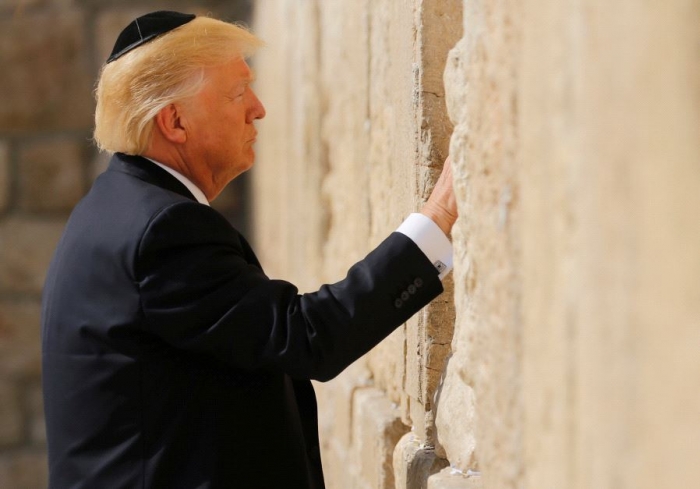Secretary of State Rex Tillerson approved a security plan for "a facility" in Jerusalem Thursday evening, Goldstein said. "We're looking at that as a possible date but safety of the Marines and other people who visit and work there is primary."
The embassy will be located in a building that houses the U.S. Consulate General Jerusalem, in the Arnona neighborhood of the city, according a State Department statement. Consular operations will continue there, and U.S. ambassador to Israel, David Friedman, will work there with a small staff.
A new embassy annex will open by the end of 2019 with more space for the ambassador and his team, while planning and construction for a permanent embassy in Jerusalem proceed, the statement said.
The current embassy building in Tel Aviv will be renamed the U.S. consulate, and will continue to house the bulk of the U.S. diplomatic staff in Israel, according to this plan.
Vice President Pence told the Israeli Parliament last month that a new U.S. Embassy to Israel would open in Jerusalem before the end of 2019.
Trump announced in December the controversial decision to recognize Jerusalem as Israel's capital and begin the process of moving the U.S. Embassy there. West Jerusalem is where Israel's government is based. Palestinians view East Jerusalem as the capital of a future Palestinian state. For that reason, every U.S. president since Israel's founding in 1948 has located the U.S. Embassy in Tel Aviv.
Majdi Khladi, diplomatic advisor to Palestinian Authority President Mahmoud Abbas, was quick to criticize the plan.
"What is important here is that without the approval of the Palestinians and specifically President Abbas, there is not going to be anything happening here. We know the Americans are coordinating every step with (Israeli President Benjamin) Netanyahu, but they do not do the same with President Abbas," Khladi said Friday. "In the end this is not good for peace, and no good for themselves, their own standing.”
Trump's Jerusalem announcement fulfilled a campaign promise and upended decades of U.S. foreign policy over the contested city.
“What we want is a clear statement that will allow the Palestinians to have a state of their own, independent, within the 1967 borders, with East Jerusalem as its capital,” Khladi added.
The Palestine Liberation Organization (PLO) secretary general Saeb Erekat said the move shows "the determination of the U.S. administration to violate international law destroy the two-state solution, and provoke the feelings of the Palestinian people, as well as of all Arabs, Muslims and Christians around the globe."
Erekat said the decision disqualifies Trump and the U.S. from being part of a "solution between Israelis and Palestinians; rather, the world now sees that they are part of the problem."
The Trump administration is also considering an offer from Republican mega-donor Sheldon Adelson to pay for at least part of a new U.S. Embassy in Jerusalem, four U.S. officials told the Associated Press.
A move in May would be much sooner than was expected. The announcement comes a day after Nikki Haley, the U.S. ambassador to the United Nations, told a crowd at the University of Chicago's Institute of Politics that Trump's plan for Israeli-Palestinian peace is close at hand.
"They're coming up with a plan. It won't be loved by either side, and it won't be hated by either side," Haley said, according to the Jerusalem Post. "I think they're finishing it up."
Aaron David Miller, a former U.S. peace mediator for Israeli-Palestinian talks, called the Jerusalem move "a real cosmic Oy Vey" moment.
"On the eve of ultimate peace deal may move US Embassy on Israel's Independence Day. Really?" Miller wrote on Twitter.
















































